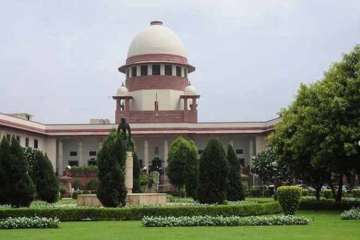India has moved forward from 1992 Babri Masjid demolition, Hindu bodies tell SC; hearing to resume on May 15
A three-judge bench of the Allahabad High Court, in a 2:1 majority ruling, had in 2010 ordered that the land be partitioned equally among three parties -- the Sunni Waqf Board, the Nirmohi Akhara and Ram Lalla.

The Hindu bodies fighting a legal battle to stake claim over the disputed site in Ayodhya today told the Supreme Court that it was purely a property dispute which should not be referred to a larger bench.
The top court was told that the issue of "political or religious sensitivity" cannot be a ground to refer the matter to a larger bench and India has moved forward since the 1992 demolition of the Babri Masjid.
A bench of Chief Justice Dipak Misra and Justices Ashok Bhushan and S Abdul Nazeer was told by senior advocate Harish Salve, appearing for original plaintiff Gopal Singh Visharad who was among the first to file a civil suit in the case way back in 1950, that there was no need to refer the matter to a larger bench since a three-judge bench was already seized of it.
"This country has moved forward from the event of 1992 and today we are left with purely a land dispute. The court will decide this on the evidence placed before it. This will be decided strictly in accordance with the law," Salve said.
He questioned the manner in which senior advocates Rajeev Dhavan and Raju Ramachandran, appearing for petitioner M Siddiq, were projecting the case as "sensitive".
Gopal Singh Visharad and M Siddiq, both original litigants in Ram Janambhoomi- Babri Masjid case, have died and are being represented through legal heirs.
Ramachandaran had said the matter should be referred to a larger bench due to its "sheer importance". He had said that it had been dealt with by the full bench of the high court, not because of a substantial question of law, but due to the fact that it would have wide ramifications on the social fabric of the country.
Earlier, the apex court had said it would decide on whether to refer to a larger bench the issue of reconsideration of the entire 1994 verdict dealing with the acquisition of the disputed land in Ayodhya or parts of it.
However, Salve maintained that factors like "politically sensitive, religiously sensitive" should be kept out of the court room. "These (issues) are all those things which should be kept outside the gate of the court," he said, adding that the matter was a title suit which would be adjudicate on whether the property belongs to 'A' or 'B'.
Referring to the apex court traditions and said if an order is passed by the full court of a high court, the appeal in the apex court would be heard by a three-judge bench.
Salve referred to the 'triple talaq' case which was heard by a five-judge constitution bench, and said a larger bench had adjudicated the issue as it related to the important aspect of gender justice.
Questioning the approach of Dhavan and Ramachandran in saying that this was a matter of "sheer importance", he said "the cases which were sent to a five-judge or seven-judge bench have raised very serious questions."
Maintaining that the issue of constitutional importance were involved in those matters, he said the argument that there is a dispute between two community does not hold in this case, as it is "purely a property dispute". "When there is a substantial question of constitutional importance, then the larger bench can hear it," he said.
Former Attorney General and senior advocate K Parasaran, appearing for the deity, Ram Lalla Virajman, supported Salve's arguments and said the matter should be heard by a three-judge bench only.
He too said the court should not send the matter to a five-judge bench as several evidence and documents will be needed to be examined and the larger bench should not do it as it is a property dispute.
"The five-judge constitution bench can only deal with a substantial question of law and not a property dispute, which is a civil matter. This is not a complicated or that sensitive matter which needs to be heard by a larger bench," he said.
At the outset, Ramachandaran said the matter needed to be referred to a larger bench as it is matter of "sheer importance". He said that considering the importance of the matter, the arguments of the state government, a full bench of the high court had dealt with the matter.
"This case in the high court was dealt by the full bench not because there was substantial question of law or there was conflict of opinion among judges, but only due to the sheer importance of the matter, the background and the parties involved", he said.
He said the outcome of this case will have wide ramifications on the social fabric of the country as two major communities are involved in it.
"This court is hearing a first appeal and when a case of such importance or magnitude in which the high court has constituted an extra-ordinary bench to adjudicate it, then a five-judge bench should hear it," Ramachandaran said, adding that only a larger bench can give the matter a "judicial quietus" by an authoritative pronouncement.
The hearing on the matter remained inconclusive and would continue on May 15.
The special bench of the apex court is seized of a total of 14 appeals filed against the high court judgement delivered in four civil suits. A three-judge bench of the Allahabad High Court, in a 2:1 majority ruling, had in 2010 ordered that the land be partitioned equally among three parties -- the Sunni Waqf Board, the Nirmohi Akhara and deity Ram Lalla.